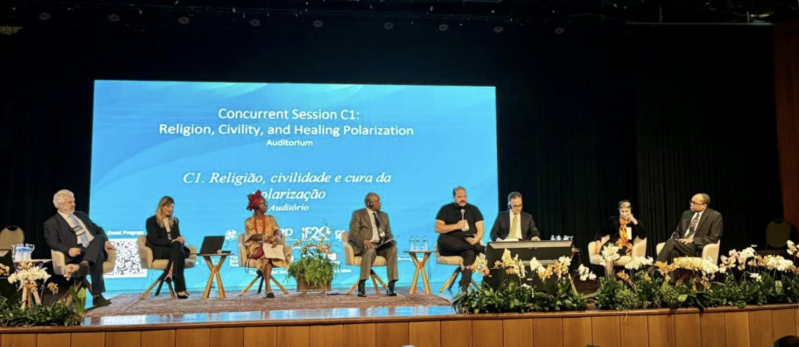
From August 19 to 23, the G20 Interfaith Forum is taking place in Brasilia, featuring key contributions from Evangelical leaders. Pastor Juan Cruz Cellammare, President of the Latin Evangelical Alliance, and Pastor Harold Segura, Director of the Faith and Development Department for World Vision Latin America and the Caribbean, were among those prominently involved. Their contributions have centered on vital issues such as religious freedom, poverty, social inequality, and the Church's role in fostering a more equitable world.
Cellammare, who spoke at the Forum’s opening, emphasized the historic role of the Evangelical Church in society. “Throughout history, the Evangelical Church has played a significant role in social transformation and in the promotion of equal rights and opportunities in various regions of the world. Its contributions can be seen in the important community work that is carried out, helping the most vulnerable to have access to basic resources such as food, education, health care and environmental care.”
Representing 22 Spanish-speaking nations and a constituency of 25.3% of the Latin American population, Cellammare underscored the importance of religious freedom as a fundamental right. He noted that while this right should be universally respected, it remains an issue in many countries. He vowed to continue advocating for the protection of Christians and the guarantee of religious freedom worldwide, and emphasized, “The spirit we have as Christians is to serve, help, and fight for those in need, to move towards a more equitable world with greater opportunities.”
In another session, Pastor Harold Segura highlighted the moral and spiritual dimensions of poverty and inequality. “Poverty and social inequality is not only a concern of an exclusively social or political nature, but also a profound moral, spiritual and religious question,” he asserted.
Segura, whose organization works extensively with vulnerable children, criticized the moral implications of poverty and hunger. He stated, “The figures of poverty and inequality, especially those reflected in the face of hunger and malnutrition, are spiritually speaking, immoral. From the perspective of faith, without distinction of creed, they contradict the basic foundations of our beliefs and disdain the religiosity of our peoples. They are a pale portrait of the hopes and commitments that our faiths (in the plural) teach us in their sacred texts and through their great teachers.”
Segura also addressed the consequences of hunger, including migration, child labor, and exploitation. He questioned, “And what do we religious communities have to say about the root of these ills, their causes and solutions?” He explained that poverty reflects not just material deprivation but also systemic injustice and oppression, challenging both personal and communal ethics.
During the session on “Religion, Civility and Healing Polarization,” Cellammare further explored how religious leaders can foster understanding and dialogue among diverse groups. He advocated for collaboration in areas of shared concern, emphasizing that “religious leaders can help promote understanding, compassion and dialogue among different groups.” He urged that, “As religious leaders, we see positive collaboration in areas such as the defense of life and family, religious freedom, health prevention, migration issues, and response to natural catastrophes. We can use our influence and moral authority to strongly condemn hatred, promote unity and build bridges between communities.”
Cellammare emphasized the need for religious leaders to address issues with respect for human dignity and ethical principles, advocating for a concerted effort to achieve social cohesion and lasting peace. “It is crucial that we religious leaders address these issues in a way that respects human dignity and fundamental ethical principles. We must foster mutual understanding and heal divisions, rather than exacerbate them. Only through a concerted effort by religious, political, and civil society leaders can we achieve greater social cohesion and a lasting peace that benefits all,” he concluded.
Segura echoed this sentiment, proposing two key actions: “I urge the G20 to support and fund programs that ensure access to nutritious food for all children, especially in rural and marginalized communities. This is not just a matter of public policy, but of justice and compassion,” he stated.
He also called for “recognizing and embracing the role of faith communities as promoters of social cohesion. Faith communities are essential in creating social cohesion by fostering shared values and providing spaces for dialogue and peaceful mediation. Through their moral and spiritual influence, they promote reconciliation and mutual understanding, acting as bridges in contexts of conflict and strengthening the social fabric.”
Originally published by Diario Cristiano, Christian Daily International's Spanish edition.





